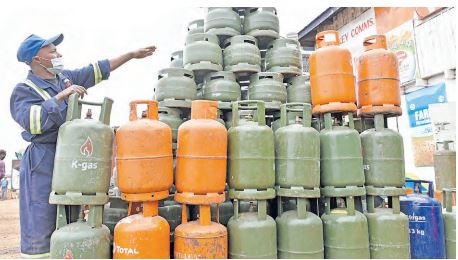The government has approved procurement of Liquefied Petroleum Gas (LPG) through the Open Tender System (OTS) in a move that could end monopoly in the industry and lower the cost of cooking gas.
A Cabinet meeting chaired by President William Ruto at State House Nairobi, yesterday, also okayed importation of heavy fuel oil and bitumen through a centrally coordinated bulk procurement system.
Petroleum products will however continue being imported through the Government-to-Government (G-to-G) arrangement with the Gulf after Cabinet extended the deal that has been in place since April 2023.
“This arrangement has eased the monthly demand for US dollars for petroleum imports, stabilising the shilling-dollar exchange rate at Sh129 from a high of Sh166 and reducing pump prices from Sh217 per litre of petrol to Sh177.
The arrangement secures the supply of refined petroleum by allowing payments in Kenya shillings, previously estimated at $500 million a month,” the Presidency said in a statement.
Moving LPG to the Open Tender System could however be one of the key decisions in the energy sector that Cabinet has made, amid an ambitious plan to increase annual LPG uptake from 7kgs per capita to 15kgs and enhance penetration from the current 24 per cent to 70 per cent by 2028.
The OTS is intended to help consumers, both commercial and households, access gas at lower prices and is also part of the government’s efforts to reduce the carbon impact of fossil fuels.
The system, similar to what was being used to import petroleum products before the switch to a government-to-government deal, is based on agreed terms and conditions, and the price is made up of import costs, market prices and local currency components, with bidders competing to offer lower price marks.
This is unlike the current space where the importer puts their own markups, with lack of competition exposing consumers to exorbitant prices.
The government is working with the private sector to establish a common-user import facility at the Kenya Petroleum Refineries Limited (KPRL) in Mombasa, President William Ruto said.
If the lower landed cost fails to translate to lower retail prices, retail price caps may be considered.
The President said zero-rated taxes on LPG have improved storage infrastructure nationwide, adding that addressing the volumes, sustainability and affordability is critical for the sector’s growth.
He said the government has developed robust policies, regulations and standards to ensure the sector’s growth while safeguarding health and safety.
“A thriving LPG sector promises significant economic benefits, including increased investment and job creation,” he said when he launched the Liquefied Petroleum Gas (LPG) Programme for schools at Jamhuri High School, Nairobi, on Monday.
An OTS is expected to trigger more interest from Oil Marketing Companies in the country, ending monopoly where Africa Gas and Oil Ltd has been handling up to 90 per cent of imported volumes, with a 10,000-tonne storage facility in Mombasa.
Tanzanian-owned firm, Taifa Gas SEZ Kenya Ltd, is expected to construct a 30,000-tonne LPG storage facility at the Dongo Kundu Special Economic Zone in Mombasa, a project that commenced in February last year albeit slow implementation.
Government-owned Shimanzi Oil Terminal has a 1,400-tonne capacity with another smaller facility at KPRL.
Demand for LPG increased by eight per cent to 360,594 metric tonnes in 2023, EPRA data indicates.



